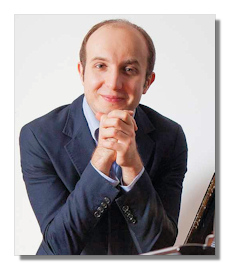
The Internet's Premier Classical Music Source
Related Links
- Latest Reviews
- More Reviews
-
By Composer
-
Collections
DVD & Blu-ray
Books
Concert Reviews
Articles/Interviews
Software
Audio
Search Amazon
Recommended Links
Site News
 Concert Review
Concert Review
Rachmaninoff at the BBC Proms

- Sergei Rachmaninoff:
- Piano Concerto #3 in D minor, Op. 30
- Symphony #2 in E minor, Op. 27
- Anon.: Two Russian Orthodox Chants
- "Thy tomb, O Saviour"
- "Serene Light"
Alexander Gavrylyuk, piano
Latvian Radio Choir
BBC Scottish Symphony Orchestra/Thomas Dausgaard
Royal Albert Hall, London, 13 August 2017
London's Royal Albert Hall can be a difficult venue to play. The Ukrainian pianist Alexander Gavrylyuk left an unforgettable impression two years ago in Rotterdam with a superb rendition of the very same Rachmaninoff Piano Concerto #3 under Valery Gergiev. Gavrylyuk is a subtle artist and clearly knows how to dose his Rachmaninoff. His playing reveals enormous depth underneath the lightest of surfaces and refuses every bit of flash or showiness. The slower passages sound compellingly tender and introverted in his hands, standing out just as much, if not more, as the technical fireworks. This time, in his BBC Proms debut, Gavrylyuk still had me convinced by his approach, even if compared to his Rotterdam performance I felt that the Royal Albert Hall audience was somehow shortchanged and part of the emotional intent of his message simply vaporized within the immense space of the hall – as in the very opening of the Concerto and in the Intermezzo: Adagio. (I suspect people who followed the concert live on TV or on the radio were able to appreciate the range of his playing a lot more than we did).
But this is how it goes in live music-making and to be sure this was still a magnificent performance. The tonal beauty of Gavrylyuk's piano, his grip on the work's structure as well as his mercurial speed in some of the passages and the exciting, well-judged buildups held the audience spellbound. Thomas Dausgaard stuck very closely to his soloist – literally leaving him rarely out of sight - and ensured the most sympathetic accompaniment from the BBC Scottish Symphony Orchestra, including beautiful solo work from woodwinds and horns.
As an encore Gavrylyuk performed Rachmaninoff's Vocalise in the transcription by Vladimir Horowitz. Again, the audience seemed mesmerized by his reflective pianism – one could hear a pin drop and it took a long time after the last note subsided before they erupted in applause.
Music of the Russian Orthodox Church has been a great influence on Rachmaninoff's style and it was a fine idea to preface both major works of this evening by ancient monastic chants, performed by the Latvian Radio Choir. The likeness between "Thy tomb, O Saviour" and the opening theme of Rachmaninoff's Third Piano Concerto has been pointed out (although the composer denied any direct origins) and was well illustrated here. Preceding the Concerto members of the Latvian Radio Choir entered the hall processing down to the arena through the audience before disappearing under the stage.
The concert continued with Rachmaninoff's Second Symphony, again introduced by an Orthodox chant "Serene Light" from the Latvians, effectively performed this time from the top Gallery. Conducting from memory, Dausgaard led an outstanding performance of the massive symphony, well-shaped and phrased throughout. Swift, lean and often vigorous, he kept things going, enough so in the first movement to justify the exposition repeat, while the dynamic divided strings of the BBC Scottish Symphony unraveled Rachmaninoff's polyphonic textures to delight. This is a long work, but it didn't feel this way here. I missed some of the darker colors in the brass and the bass strings sounded from where I was sitting slightly underwhelming. This was undoubtedly more a problem of the hall's acoustics again. Solos were without exception beautifully performed, though, especially the clarinet solo from Yann Ghiro in the Adagio and the first horn. In short, it was a superbly rewarding Rachmaninoff evening at the Proms.
Copyright © 2017, Marc Haegeman












